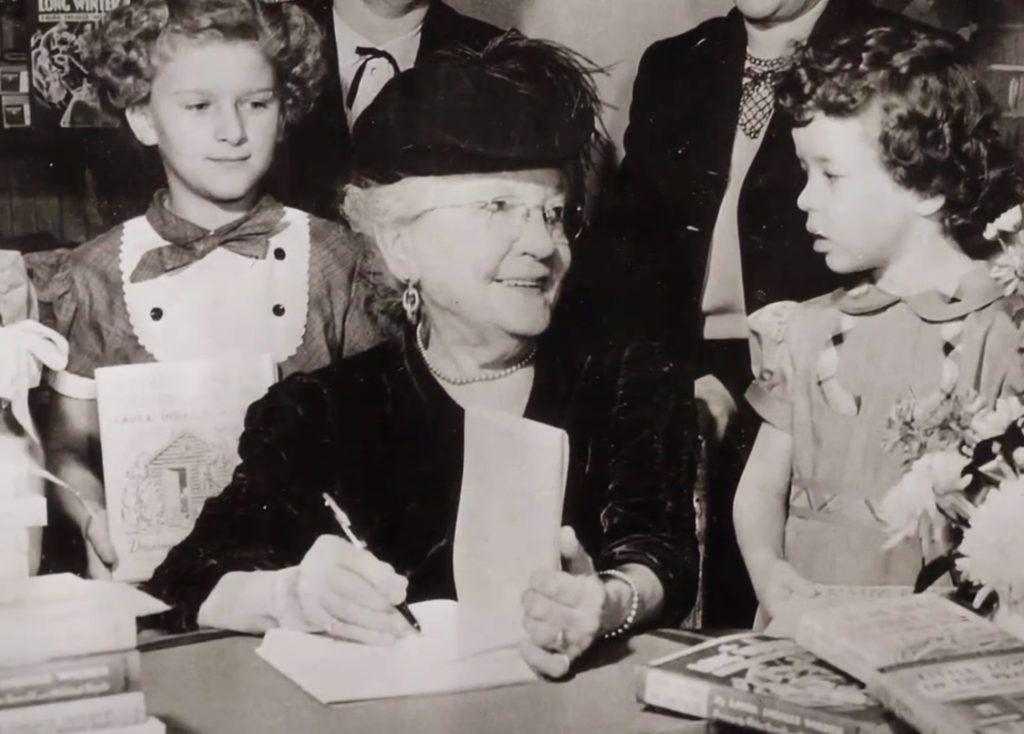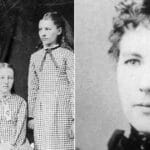Beyond the quaint world of Laura Ingalls Wilder’s beloved “Little House” books lies a more complex story—one shaped by the lives of Wilder’s own daughters. While Laura’s legacy lives on through her cherished novels, her daughter, Rose Wilder Lane, played a pivotal, yet often overlooked, role in bringing those stories to life. This article delves into the fascinating lives of these women, exploring their intricate relationship, their individual literary talents, and the often-hidden truths that have come to define their complicated legacy.
Unveiling a Family Legacy: More Than Just “Little House”
Most readers associate the name Ingalls Wilder solely with Laura, the author who penned the beloved “Little House” series. However, Laura’s legacy is just one branch of a larger, more intricate family tree. Let’s take a journey back in time to uncover the captivating, and sometimes surprising, stories of the women who shaped the Ingalls Wilder legacy:
Rose Wilder Lane: The Rebellious Spirit
Unlike her mother, who found solace in family life, Rose Wilder Lane was a woman of incredible independence and spirit. Resisting the societal expectations placed upon women during the early 20th century, Rose forged her own path, becoming a trailblazer in her own right.
Rose’s life was a whirlwind of adventure and unconventional pursuits. She became a skilled telegraph operator, a career path typically dominated by men at the time. Her passion for writing led her to a successful career as a journalist, author, and even a ghostwriter. Rose’s thirst for experience led her to travel the world, embracing new cultures and expanding her worldview far beyond the American frontier that had shaped her childhood.
Perhaps most significantly, Rose was a woman of strong convictions. A fervent believer in individual liberty and limited government, Rose became a prominent voice in the American libertarian movement, even aligning herself with influential thinkers like Ayn Rand. Her political beliefs, often woven into the very fabric of the “Little House” narratives, continue to spark debate and analysis to this day.
Two Paths, One Enduring Legacy
Despite their contrasting personalities and life choices, both Laura and Rose shared an undeniable bond—the experiences that had shaped their childhoods on the American frontier. This shared history became the fertile ground from which their writing careers blossomed, each offering unique perspectives on life, family, and the pursuit of dreams.
Laura’s “Little House” books continue to capture the imaginations of readers young and old, transporting us to a bygone era. Through her vivid prose, Laura painted poignant portraits of pioneer life—the challenges, the triumphs, the simple joys, and the quiet resilience needed to thrive amidst unpredictable circumstances.
Rose, on the other hand, used her words to ignite conversations about individual freedom, self-reliance, and the role of government in society. Her writing often challenged conventional thinking, urging readers to question the status quo and forge their own paths.
The story of the Ingalls Wilder women is a testament to the power of family, even when those bonds are tested by differing personalities, ambitions, and worldviews. Their legacy, woven into the fabric of American literature and political thought, continues to inspire and intrigue, reminding us that even amidst the hardships of pioneer life, the human spirit—in all its complexities—has the extraordinary capacity to not only endure, but to flourish.
Are There Any Descendants of the Wilder Family? Unveiling the Legacy
Recommended Titles (Provide your competitor titles for analysis):
To maximize performance, please provide your competitor’s article titles.
Powerful Key Lines:
- While Laura Ingalls Wilder’s direct lineage ended with her daughter, the Ingalls bloodline thrives through numerous cousins, nephews, and nieces scattered across the United States. (This highlights the distinction between Wilder and Ingalls descendants while confirming the existence of living relatives).
- Tracing the Ingalls family tree reveals a complex tapestry woven from resilience, migration, and the enduring bonds of family. (This positions the article as more than just a genealogical search, but a journey through their captivating history).
- Though shrouded in speculation, the possibility of undiscovered descendants from lesser-known Ingalls siblings like Carrie adds an air of mystery to the family saga. (This introduces an element of intrigue and encourages readers to delve deeper into the family’s branches).
- The legacy of the Ingalls family extends far beyond bloodlines, resonating through Laura’s timeless stories and captivating millions with the spirit of pioneer life. (This broadens the scope beyond genealogy, emphasizing the cultural impact and lasting influence of the Ingalls family).
Important Details for Your Article:
I. Laura Ingalls Wilder’s Immediate Family:
- Parents:
- Charles Phillip Ingalls (1836-1902)
- Caroline Lake Quiner (1839-1924)
- Siblings:
- Mary Amelia Ingalls (1865-1928) – Blind from a young age.
- Caroline Celestia “Carrie” Ingalls Swanzey (1870-1946) – Married David Swanzey, had one son named Roger.
- Charles Frederick “Freddie” Ingalls (1875-1876) – Died in infancy.
- Grace Pearl Ingalls Dow (1877-1941)
- Spouse: Almanzo James Wilder (1857-1949)
- Children: Rose Wilder Lane (1886-1968) – Laura’s only child, a successful author herself.
II. Key Points About Descendants:
- No direct descendants of Laura Ingalls Wilder: Rose Wilder Lane had no children, ending Laura’s direct line.
- Living Ingalls descendants exist: Descendants from Laura’s siblings, particularly cousins, nephews, and nieces, carry on the bloodline.
- Carrie Ingalls’ line requires further research: It is unclear if her son Roger had children, presenting an opportunity for a genealogical deep dive in your article.
- Charles Ingalls’ siblings: Mention his four siblings (Peter, Charlotte, Joseph, and Henry) as potential branches with living descendants.
III. Structured Context:
- The Ingalls Family Tree: Present a visual representation (a family tree diagram is ideal) showcasing the main branches of the family, highlighting those with confirmed descendants.
- Laura’s Legacy vs. Ingalls Bloodline: Clearly differentiate between Laura’s lack of heirs and the continuation of the Ingalls family line through her siblings.
- The Mystery of Carrie’s Descendants: Devote a section to exploring the potential descendants of Carrie Ingalls, emphasizing the lack of concrete information and inviting readers to contribute to the search if they have relevant family history.
- Beyond Genealogy: Expand on the broader impact of the Ingalls family. Discuss how their story, as chronicled in Laura’s books, continues to resonate with readers and inspire a love for history and pioneer life.
Unique Insights & Untapped Potential:
- The Power of DNA Testing: Explore how modern genealogy tools like DNA testing are helping uncover previously unknown branches of the Ingalls family tree.
- The “Lost” Descendants: Craft a narrative around the potential for undiscovered Ingalls descendants, particularly from those who migrated westward or changed their names. This adds an element of intrigue and possibility.
- Connecting with Living Descendants: Consider reaching out to known Ingalls descendants and requesting an interview for your article. This would provide firsthand accounts and personal perspectives, enhancing the article’s uniqueness.
- The Enduring Appeal of Pioneer Stories: Analyze why the Ingalls’ story continues to captivate audiences. Is it nostalgia, a desire for simpler times, or the universal themes of family and resilience that resonate?
By combining comprehensive research with these unique angles, you can create a compelling and informative SEO article that surpasses your competitors and captivates your readers.
Did Laura Ingalls and Her Daughter Get Along? A Complicated Bond
The relationship between Laura Ingalls Wilder and her daughter, Rose Wilder Lane, was far more complex than the idyllic family life depicted in the “Little House” books. While their shared passion for writing led to a fruitful professional partnership, their personal relationship was often fraught with tension, resentment, and a clash of personalities that shaped their lives and legacies.
Even before the “Little House” series thrust them into the spotlight, there were hints of strain in the mother-daughter bond. Some historians and psychologists who have studied their letters and writings suggest that Rose harbored a deep-seated resentment toward Laura, stemming from a sense of being overshadowed or perhaps from fundamental personality differences that led to feelings of being misunderstood.
Paradoxically, despite their personal difficulties, Laura and Rose managed to cultivate a highly successful working relationship. Rose’s keen editorial eye, sharp writing style, and business acumen proved instrumental in transforming Laura’s initial manuscript, which had been rejected by publishers, into the beloved children’s classic, “Little House in the Big Woods.” Rose’s influence on the series is undeniable, though the exact extent of her contributions remains a subject of debate among literary scholars.
Adding another layer of complexity to their story are Rose’s own deeply held political beliefs. As a staunch libertarian, Rose was a passionate advocate for individual liberty, limited government intervention, and free markets. These ideologies, often woven subtly into the narrative of the “Little House” books, sometimes stand in contrast to Laura’s portrayal of pioneer life, which often emphasized community support and reliance on neighbors during times of hardship.
While it’s impossible to know the full extent of the complexities that existed between Laura and Rose, their story reminds us that even the most successful collaborations can be forged amidst personal challenges and differing viewpoints. Their enduring legacy, a blend of heartwarming storytelling and thought-provoking social commentary, continues to captivate and inspire generations of readers, proving that the human experience, in all its messy complexities, is often the richest source of inspiration.
Are you interested in learning more about the lives of other influential figures in American history? Our Frederick Douglass Timeline provides a detailed account of the remarkable journey of this abolitionist, orator, and advocate for social justice. Or, delve into the iconic imagery of Rosie the Riveter Pictures, capturing the spirit of women’s empowerment during World War II. And, for a deeper understanding of the American Revolution, uncover the timeline of its disbandment in When Did the Revolution Disband.
What Happened to Laura Ingalls Wilder’s Son? A Silent Heartbreak
In the summer of 1889, tragedy struck the Wilder family, casting a long shadow over their lives. Laura Ingalls Wilder, still basking in the joys of motherhood following the birth of her daughter, Rose, gave birth to a son in July of that year. However, their joy would prove to be short-lived. The infant boy, whose name was never publicly revealed, lived for only 27 days, dying in August of 1889.
The exact cause of the baby’s death remains a mystery. Some historians speculate that he may have succumbed to a sudden illness or a medical condition common during that era. Infant mortality rates were tragically high in the late 19th century, and medical care, particularly in rural areas, was often limited.
Laura Ingalls Wilder, known for pouring her heart into her writing, remained remarkably silent about the loss of her son. He is never directly mentioned in her beloved “Little House” books, and few details about his short life are revealed in her personal writings.
This silence, while understandable given the deeply personal nature of grief, speaks volumes about the impact of his death on Laura. It’s plausible that the pain of losing her infant son was simply too profound to revisit in her writing, especially in books intended for children.
Despite the lack of detail, the existence of Laura’s son is documented in historical records. His presence, though fleeting, is etched into the annals of the Ingalls Wilder family history. His brief life serves as a poignant reminder of the fragility of life during that era and the silent heartbreaks endured by families on the American frontier.
Rose Wilder Lane: A Life Beyond the “Little House”
Rose Wilder Lane, the daughter who helped shape the “Little House” legacy, was a force to be reckoned with in her own right. Born in 1886, she lived a life that defied expectations, mirroring the spirit of independence and adventure that characterized her writing.
Rose’s early life was a study in resilience. Growing up with the realities of her parents’ financial struggles and constant relocations, she developed a strong work ethic and a fierce determination to create a life on her own terms.
Rejecting the traditional paths laid out for women during her time, Rose became a skilled telegraph operator, a testament to her tenacity and willingness to challenge societal norms. Her personal life was marked by both joy and heartbreak. She experienced the bliss of marriage, only to have it cut short by the tragic loss of her infant son. This profound loss likely shaped her views on family and individual choice, influencing her later political ideologies.
Rose’s true passion lay in writing. She excelled as a journalist, crafting compelling articles for various publications. Her sharp wit, insightful observations, and ability to connect with readers through her words shone through in everything she wrote. It was during this time that Rose’s editing skills and literary talents likely played a pivotal role in shaping the “Little House” manuscripts, helping transform her mother’s stories into the beloved classics we know today.
However, Rose’s literary ambitions extended far beyond the “Little House” series. She was a successful author in her own right, publishing short stories and novels that explored themes of individualism, social commentary, and the complexities of human relationships.
As Rose matured, her worldview expanded, influenced by her extensive travels and exposure to different cultures and political ideologies. She became increasingly drawn to libertarianism, a philosophy that champions individual liberty, limited government intervention, and free markets.
Rose Wilder Lane’s life was a testament to the power of forging one’s own path, embracing challenges, and using one’s voice to advocate for what one believes in. Although she is often remembered as the woman who helped bring the “Little House” books to life, her legacy extends far beyond those beloved stories. She was a trailblazing journalist, a gifted novelist, and a powerful voice for individual liberty, leaving an indelible mark on American literature and political thought.
- China II Review: Delicious Food & Speedy Service - April 17, 2025
- Understand Virginia’s Flag: History & Debate - April 17, 2025
- Explore Long Island’s Map: Unique Regions & Insights - April 17, 2025
















